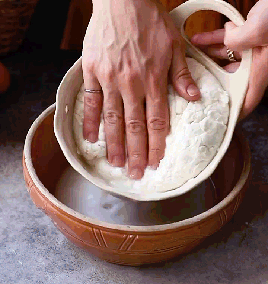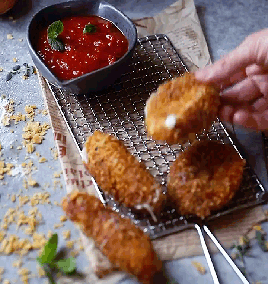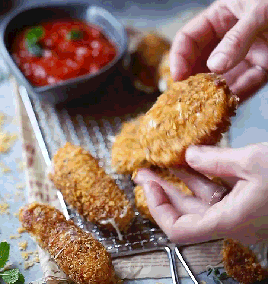#Cheese Making
Explore tagged Tumblr posts
Text




Roasted pepper and tomato soup w/ roasted pepper butter grilled cheese (x)
#food#food porn#mozzarella#grilled cheese#sandwich#tomato soup#homemade mozzarella#cheese making#fresh bread#bread#food gif#food stim#gifset#gif#roasted pepper#sourdough bread
606 notes
·
View notes
Text

Homemade Mozzarella (recipe)
416 notes
·
View notes
Note
So, I’m seriously looking into getting into tall ship sailing (waiting on follow-up from an interview rn) and I’m wondering for getting into it more long-term -
what do people do after sailing tall ships? Like, it’s a pretty physical job, and I’d assume there’s a point where your joints just can’t keep up with it.
Are there other jobs in the industry that people move to? I’m not really keen on the idea of moving up in the ship’s hierarchy- admin and being someone’s boss both aren’t really my thing. Do people retrain in completely different careers? Go back to whatever they were doing before they started sailing?
Anyway, I know your sample size might not be super large so I’d appreciate anything. Thanks a bunch!
This is hard to answer directly - on the one hand sailing tall ships is such a niche industry that there are limited pathways for straightforward advancement. But on the other hand, it overlaps with such a large number of other industries, and requires such a jack of all trades skillset - tourism, carpentry, history and preservation, hospitality, marine electronics, etc. etc. etc. - that there's a lot of ways forward for what I guess I'd call lateral advancement: moving to another job which uses most of the same skills. So there's no one answer, but if it helps, here's some things my tall ship deckhand friends have ended up doing, after no longer deckhanding tallships:
Get a captain's license and keep sailing. Captains often have it a bit easier physically (balanced out by the mental stress lol), and are paid better. Owning your own boat is optional; plenty of companies hire captains by the season to sail the boat, while the management of the company is dealt with by the actual owners. (This is what I did! I don't have the sail-hauling arms I did as a deckhand, but my knees and bank account are both in better shape).
Bosun, first mate, engineer, some other specialized non-captain crew member, usually involves licensing or other education that's useful down the road if you switch to an adjacent career
Racing yachts
Captain for hire on private vessels
Outward bound guide, other wilderness education programs
Harbor cruises, lobster tour guides, and other motor-powered tourist boats, both as captain and as crew - you have the patter and the safety skills but you don't want to deal with the hassle of sails
Water taxis, ferries and other passenger vessels
Lobstering, fishing, aquaculture, tugboats, other non-tourist waterfront industries
Marine surveyor, marine electrician, other specialized technician
Working in a shipyard - good fit for all the fit-out skills of sanding, painting, varnishing, covering and uncovering the boat
Cruise ship hostess
Train conductor (the passion for the early 1900s carried over well)
Working at a a museum focused on local maritime history
Tour guide for local buses, walking tours, etc
Boatbuilder (IYRS, Wooden Boat School)
Teaching the captain's license courses (nota bene: there were obviously some other steps between deckhand and teacher, notably ten years of being a captain in between. But this is what they settled into when they decided sailing was too physically taxing, so I want to include it).
Carpentry, house painting
Designing and selling custom made van-homes (apart from the technical skills, living on board a ship helps familiarize making use of every square inch of space)
Sailmaker
Of course there's other friends who went on to try something completely new and unrelated - I think because so many of the people who start sailing tall ships are here for something completely new in the first place, that's not an intimidating prospect so much as an exciting one. But many of them did make use of tall ship skills even when moving on from tall ships, so I hope the above list is helpful in giving a broad sense of what can follow!
#schooner bum life#i am probably forgetting some tbh#for fun. some unrelated post-sailing jobs:#artist#dog mushing in alaska#cheese making#sword maker#chocolatier#orchestra conductor#model#looking at that i think there's probably also something to be said for the confidence it takes#to pursue something you find interesting#even if it means starting from scratch#the same leap of faith that gets you on a tall ship can take you somewhere else
150 notes
·
View notes
Text







So we accidentally used a deep fryer thermometer which isn’t as accurate and heated it up to quickly so the cheese curds wouldn’t set.
So we didn’t make mozzarella, we made ricotta.
We got a lot a whey from it tho, with which we can make more ricotta.
This isn’t a failure, we did make really good cheese (not the one we were hoping for but it is what it is) this is a learning experience.
30 notes
·
View notes
Text
The God of Cheese

Aristaeus, Greek God of Beekeeping, Olive Growing, Herding, and Cheesemaking!
#cheese#cheese making#bee keeping#official cheese posts#official cheese post#aristaeus#greek#greek mythology#greek gods#olives#god#mythology
7 notes
·
View notes
Text
Faeries and Cheese
The idea of faeries liking cheese is a charming and whimsical notion that reflects the long-standing connection between folklore, food, and the natural world. People often think of faeries as creatures of mystery and enchantment, appreciating the finer things in life. Ethereal entities seem to enjoy cheese's many flavors, textures, and preparations. The prominent importance of dairy in rural life, the magical transformation of cheesemaking, and the cultural predisposition to attach supernatural preferences to legendary creatures may explain this link. Many traditions associate faeries with the land and its resources, particularly those that require care and expertise to produce. Cheese, a mixture of human and natural resources, fits this approach. Turning milk into cheese requires science and art that may appear miraculous to outsiders. Cheese preservation, with its variable and unpredictable effects, was mysterious before contemporary processes. A cuisine that combines nature's basic material with human creativity might draw faeries. Cheese may signify a bridge between the natural and the human-made, like faeries, who exist between realms.

Cheese is also associated with faeries because of their reputation as connoisseurs of fine, simple meals. Fairies occasionally consume milk, cream, butter, and other dairy products, demonstrating their inclination towards rich, nutritious foods. These species would likely like cheese, especially fresh and creamy types. Cheese pairs well with honey, pastries, and fruits, which faeries are known to love. The idea that faeries like cheese humanizes them while retaining their unearthly charm. Humans bring food to faeries in mythology to gain favor or protection. These offerings generally include cheese, a valued item and symbol of hospitality. Farmers may give the fae small bits of cheese with bread or milk to win their favor. These offerings served as both a symbol of reverence and a practical measure to safeguard one's home or animals from faeries. Faeries enjoy cheese, which may indicate generosity and reverence for invisible entities. Sharing a farmer's harvest with faeries would reap rewards, whereas stinginess or carelessness could result in spoiled milk or sick cows. The eating of cheese by faeries demonstrates the connection between legend and cuisine. Food was a symbol of community, identity, and spirituality in ancient and medieval society. Cheese represented fertility, abundance, and the rewards of careful stewardship as a land and animal product. People may have equated fairies with cheese to underscore their sacredness. People could appreciate the wealth of the land and acknowledge the mysterious forces that ruled them by envisioning faeries as cheese lovers.

Cheese has the potential to attract faeries, who are known for their tricks in folklore. Fairies are mischievous creatures who like to steal small, valuable goods from humans. Cheese, beloved in rural communities, may have been an enticing target. Tales of faeries stealing cheese from homes or barns likely fueled their affection for it. While humorous, these stories warned people to secure their food reserves and respect the invisible realm. The appeal of imagined faeries eating cheese lies in its ability to blend enchantment with reality. Faeries transform cheese, a modest but adaptable dish, into a miracle. It reminds us of the joy of simple pleasures and how folklore makes everyday objects mysterious and connected. Cheese, whether given to curry favor, stolen, or shared, symbolizes human fascination with nature and its magic in fairy lore. This thought inspires us to wonder about even the most mundane things, as if the faeries are eating cheese just beyond our perception.
2 notes
·
View notes
Text


Finally made homemade cheese! My attempt yesterday did not go well--all the cheese went out through the holes in the colander along with the whey. Today I added more rennet and let it set up longer. I also poured the whey out way more carefully. 1 gallon of whole milk made 12 ounces of cheese. Probably could have made more, but some of it went down the sink drain.
You can see a mason jar in the back with my very first try at a sourdough starter. Really excited about the cheese and the sourdough! Crossed off 2 things from my goal list for the year and it's only January 1st. Also took down the tree and all the decorations and put them in the shed. If it's not freezing tomorrow I'll reorganize the shed because everything is kind of shoved in there.
I can't wait until spring! What should I try next to be more self-sufficient?
2 notes
·
View notes
Text
We have a gallon of milk that is going to go bad while we are visiting family, so I'm going to try my hand at making farmer's cheese next week!
I think I'll make a lasagna on Monday to use it in! It'll use up some of the Italian deer sausage mix, which we have an abundance at the moment.
I'll document the adventure, but wish me luck! :)
#tradlife#tradwife#tradblr#homemaker#homemaking#traditional values#we are home today from christmas with my family and we have to travel for his family's celebrations tomorrow#so i have time to think about meals for next week#ive been wanting to try and make cheese so its exciting#cheese making#farmers cheese#i might even make some bread for it!
4 notes
·
View notes
Text
Daily Fungi Fact 5: The Penicillium genus contains various molds, some of which can create penicillin, and some others can be used to make cheese.
2 notes
·
View notes
Text

Mountain people by heart, we bring handmade cheeses styled along popular European cheeses to India. Please check out our website http://www.kumaoniblessings.com to view our profile and store.
2 notes
·
View notes
Text






Fresh mozzarella sticks (x)
#food#mozzarella#homemade mozzarella#cheese making#cheese pull#cheese sticks#mozzarella sticks#food porn#gifset#food gif#gif#mine#recipe#recipes
1K notes
·
View notes
Text

The store was out of ricotta cheese and I wanted to make lasagne so I made my own ricotta cheese. It's very easy to do and extremely tasty. Heat up 4 cups of whole milk, 1/2 cup of heavy cream, and 1/4 teaspoon of salt. Heat it up. Just before it boils, remove the pot from the heat. Add 3 tablespoons of fresh lemon juice and stir just enough to mix it. Do not over stir or your cheese will be tough. Leave the pot alone. Do not move it or touch it for 45 minutes. Then, gently, remove the curds from the pot and lay them in a strainer that has 2 layers of cheese cloth in it. Leave it alone for an hour. Voila. You have ricotta cheese!! It's delicious 😋 and satisfying to make. I hope that you try it and have as much fun as I did making it. In the words of Julia Child... bon Appétit
13 notes
·
View notes
Text
Day 140: Gale Wallar | Boule de Lille and Others | Acrylic | 12x12

link
–This image is part of the public domain, meaning you can do anything you want with it ! (you could even sell it as a shirt, poster or whatever)–
#art#copyright#free art#open source#public domain#flickblr#flickr#cheese#acrylic on canvas#acrylic painting#acrylpainting#acrylic#acrylart#acryliquepainting#acryllic#dairy#cheese making
4 notes
·
View notes
Text
Mum and I are making mozzarella today!


13 notes
·
View notes
Note
Cheese? Tell me more
Well, it all started on a... Actually I don't remember when, but I was in the library binge reading recipe books, as you do. Then I got to a book called easy cheese making(or something like that), and without much thought started reading that too.
Now, for the record I do already know some basics on the how and why of cheese, because I collect random niche knowledge like a dragon, so I know that generally you need pasteurized only milk, if not entirely raw unprocessed milk. Since I lived somewhere that basically only have ultraheat treated (aka shelf stable) milk, I didn't read the cheese book expecting to actually do something. It's just a interesting read and nothing else.
However! I happened to find a single line mentioning treating uht milk to make it work, and what is used to do that. It's like, mentioned extremely off handed, but it got me intrigued. So I looked up the chemical (potassium chloride) online, found out how and why it works (mending the broken calcium bond in casin or something), how much does a pack of food grade KCl cost (very cheap), what dose is needed (extremely low and diluted), what potential side effects it could have (basically nothing at the range of dosage needed), and what other uses it have (to make low sodium salt; a potassium supplement; and in high enough dosage, is the final drug in the lethal injection cocktail in USA executions. Among other things)
But anyway I bought a pack of the salt, measure out a tiny pinch, got myself two cartons of the cheapest milk available, and succeeded in making cheese ;D
The cottage-ish cheese that I made is quite bland, aside from the ungodly amount salt, but that I can make it at all is what matters. It's very good in dips and over pasta and bread, just have to cut down the salt in any dish it goes in because I drowned the cheese in salt... It looks grainy and crumbly but is actually surprisingly smooth.
Also, I keep the whey (left over liquid) and used it as stock in soup, which is again, surprisingly good. I took care to only keep the unsalted batch tho, which is definitely a wise choice, considering I over did the salt. But I actually quite like the extremely salty product, it's great as kind of a condiment and makes it last slightly longer. Still has to be careful tho because the homemade stuff can't keep long at all.
Anyway, is it practical? Hell no, it is cheaper than buying cottage cheese where I live but that's just because cheese and dairy products are expensive here period. It's generally too much effort if you just want some cheese, and I know the use of food additives makes some people uncomfortable.
Is it extremely fun though? You bet! It's a fun way to spend a afternoon if you like doing experiments and also like cooking.
3 notes
·
View notes
Text
I'm thinking about making goat cheese. I've necer made cheese before... Yoghurt yes but not cheese.
4 notes
·
View notes